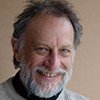Ian Gibbins
Ian Gibbins is a poet, electronic musician, and video artist, having been a neuroscientist for more than thirty years and Professor of Anatomy for twenty of them. His poetry covers diverse styles and media, including electronic music, video, performance, art exhibitions, and public installations, and has been widely published in print and online, along with three books: Urban Biology (2012); The Microscope Project: How things work (2014) and Floribunda (2015), the last two in collaboration with visual artists. He also has a key role in organising the Adelaide Festival of Ideas.
As I write this article in my Adelaide Hills home, surrounded by native eucalypts and introduced fruit trees, large areas in New South Wales are dealing with the consequences of some of the worst bushfires in recorded history. Remarkably, given the unseasonally extreme weather, the rugged terrain, and the ferocity of the fires themselves, there have been few human casualties. Nevertheless, the cos ... (read more)
David Rothenberg’s formal appellation at the New Jersey Institute of Technology is Professor of Philosophy and Music. He refers to himself as a ‘musician, composer, author and philosopher-naturalist’. Others have called him an ‘interspecies musician’. Rothenberg, a highly regarded jazz saxophonist and clarinettist, has published a range of books on science, technology, and music. But an ... (read more)

